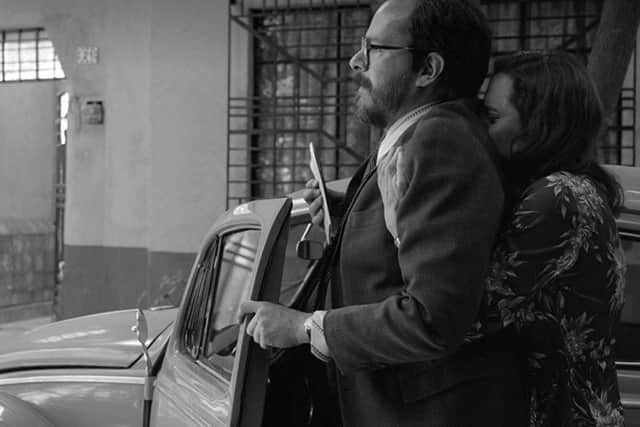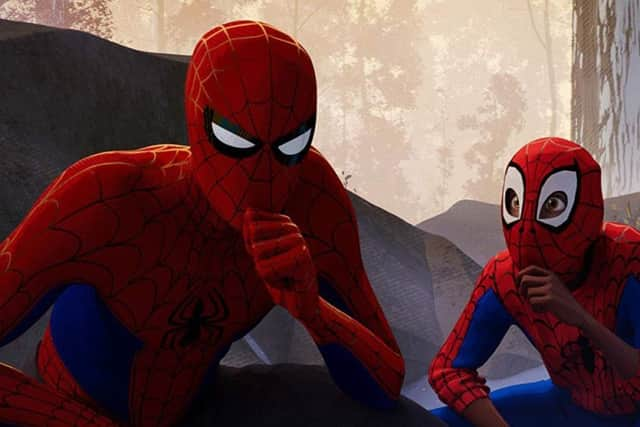Film reviews: Roma | The House that Jack Built | Spider-Man: Into the Spider-Verse | Mortal Engines | An Artist's Eyes


Roma (15) ****
The House that Jack Built (18) ***
Spider-Man: Into the Spider-Verse (PG) ***


Mortal Engines (12A) **
An Artist’s Eyes (15) ***
Netflix’s ongoing determination to disrupt traditional cinematic release patterns continues apace with Alfonso Cuarón’s Roma, which drops globally on the streaming service this weekend, in addition to opening in a couple of cinemas in Scotland (it’s already been hothoused on the autumn festival circuit and played in a smattering of cinemas in and around London). More than any of the streaming giant’s big releases this year – Alex Garland’s Annihilation, Paul Greengrass’s 22 July, David Mackenzie’s Outlaw King, the Coen brothers’ The Ballad of Buster Scruggs – it’s a film that, yes, probably does benefit from being seen on the big screen. Nevertheless, that benefit doesn’t necessarily outweigh the benefit to film fans of having relatively convenient access to one of the year’s major talking-point movies.
It’s also the sort of film that a major studio would be unlikely to fund, let alone provide with a large nationwide release, so all the Cannes-inspired hoo-hah about Netflix killing cinema feels somewhat reactionary. Indeed, on paper this subtitled black-and-white opus – about a housemaid working for an upper-middle-class family in Mexico City in the early 1970s – sounds more like a small arthouse palate cleanser for a filmmaker coming off a straight run of acclaimed franchise films and sci-if blockbusters. But the Gravity Oscar-winner is a humanist filmmaker first and foremost and with the semi-autobiographical Roma – which is named for the neighbourhood in which he grew up – he treats the story of his protagonist, Cleo (newcomer Yalitza Aparicio), with the same sort of epic scope he deployed in his dystopian masterpiece Children of Men.


Advertisement
Hide AdBeloved by the family she works for, but very clearly an outsider too, Cleo finds herself on an intense journey when she becomes pregnant just as her employer’s husband walks out on the family. Cuarón, who apparently based the story on a housekeeper who worked for his own parents, uses a series of ravishing images to draw parallels between the emotional upheaval she’s experiencing and the political upheaval happening on the streets of Mexico City. Whether it’s an earthquake shown from inside a maternity ward, the Corpus Christi massacre bleeding into a shopping trip, or simply a visit to the beach or the cinema, the film repeatedly pays tribute to the way small, seemingly marginalised lives can have a transformative effect on those they come into contact with. A generous and lovingly made film.
Those are not things that could be said about Lars von Trier’s latest. The House that Jack Built finds the Danish provocateur baiting his audience in the age of #MeToo with a serial killer film in which the murderer – an architect and engineer of private means played by Matt Dillon – equates his own sociopathy with artistic genius. Wilfully banal dialogue and hideously cruel violence – mostly perpetrated against a slew of “stupid” women played by, among others, Uma Thurman and Riley Keough – make for deliberately grizzly viewing, though to what end is a question audiences may be tiring of trying to figure out. That said, just when it feels justifiable to dismiss the film as another of his tiresomely impish cinematic installations (structurally it’s a mirror image of the woeful Nymphomaniac), he takes the film into a wild, Gustav Doré-inspired descent into Hell, one that transforms the film into an oddly beautiful and richly symbolic portrait of a prankster reckoning with his own misdeeds and finding out too late that he’s the punchline.
Spider-Man: Into the Spider-Verse sees the web-slinger get his first big animated movie, one that’s quite separate from the recent live-action reboot that folded him into the larger Marvel Cinematic Universe. The good news here is that this very nerdy and very kid-friendly film is pretty entertaining, courtesy of a plot in which a rupture in the space-time continuum allows an ageing Peter Parker (voiced by Jake Johnson) to mentor a new Spider-Man called Miles Morales (Shameik Moore) as he gets to grips with new powers brought on by, yes, another radioactive spider bite. Irreverent comic book in-jokes, a collage-like mix of animation styles and a vocal cameo from Nicolas Cage add to the fun.
Written and produced by Peter Jackson and his Lord of the Rings co-writers Fran Walsh and Philippa Boyens, sci-fi fantasy Mortal Engines manages to be even duller than The Hobbit. Adapted from Philip Reeves’s best-selling book about an analogue-powered dystopian future in which mega cities like London roam the Earth eating up smaller towns, it basically consumes the plot of the original Star Wars trilogy and the aesthetics of Mad Max 2 and spits it out a dreary, effects-heavy quest movie in which a band of disparate rebels must work together to prevent a power-hungry villain (Hugo Weaving) from turning St Paul’s Cathedral into the Death Star.
Following rising British art star Chris Moon, An Artist’s Eyes offers up a fascinating portrait of a painter determined to exist in the moment. That’s largely because – as Moon puts it himself in the film – the past fuels his depression and the future fills him with anxiety. Being in the moment, then, has become something of a survival strategy, a concept to which veteran director Jack Bond stays true. As he films Moon going about his day, he resists the temptation to provide any context-setting analysis of his subject. The end result is a suitably and pleasingly abstract sketch of someone whose place in the larger art world has yet to take shape. ■